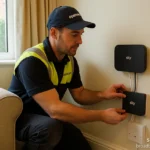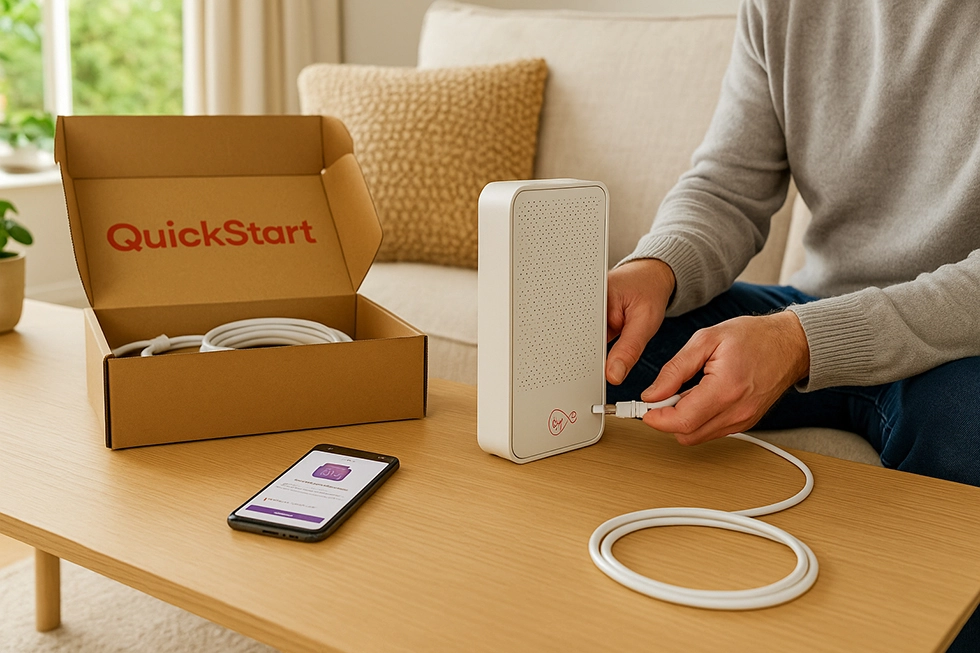Virgin Media and O2 have introduced Lumi AI, a smart new tool that supports their agents in handling customer issues more quickly and efficiently. The goal is to cut down waiting times and help customers get better, quicker solutions.

The Reason Behind Lumi AI’s Arrival
The UK broadband market is under growing pressure to improve customer experience. Virgin Media, like many large ISPs, has faced criticism in Ofcom reports over long wait times, complex billing queries, and repeated call transfers. Lumi AI is VMO2’s latest effort to resolve these concerns by helping agents solve issues first time, rather than passing customers between departments.
Unlike generic AI chatbots, Lumi AI works behind the scenes to support human agents. It processes millions of past interactions and uses real-time conversation analysis to suggest answers, resolutions, or follow-up questions during active chats and calls. It’s designed to make agents faster and more accurate, without removing the human element of customer support.
AI Support, with Humans in Charge
Lumi AI does not replace support staff — instead, it acts as a live co-pilot. For example, if a customer has an issue with broadband performance, the AI can suggest next steps based on similar cases. If a billing problem comes up, Lumi can highlight which fixes worked in the past and point the agent in the right direction without delay. It also helps agents offer upgrades, discounts, or services that might be relevant, based on the customer’s history and package.
This real-time guidance system is already being trialled across care, telesales, and retention teams. A wider rollout is expected in the coming months, including within VMO2’s newly formed 500-person team in Manchester, set up specifically to handle the most difficult and sensitive service issues.
How It’s Helping So Far
Virgin Media claims Lumi AI builds on earlier AI-driven tools already in use. According to the company, these tools have helped reduce overall complaints by more than 50% over the last year, while increasing first-contact resolution. In simple terms, more problems are being fixed the first time customers get in touch, with fewer needing to follow up again later.
Call waiting times and transfers between departments have reportedly dropped too, as support teams now need less time to understand the customer’s situation and find the right fix.
How It Helps Broadband Customers
For everyday broadband users, particularly those using Virgin Media’s M125, M250, or Gig1 full fibre plans, quicker and more accurate support could make a real difference. Fast download speeds are essential, but if something goes wrong — a connection drop, unexpected charge, or faulty router — a good service experience matters just as much.
If Lumi AI lives up to its promise, customers will no longer need to explain their issue multiple times or be passed between departments. Instead, they’ll deal with a well-informed agent who can sort things out quickly. That’s especially helpful in a broadband market where many providers still fall short on after-sales support.
Why More Broadband Providers Are Using AI
Virgin Media is not the first ISP to explore AI. Vodafone recently launched its own support model called “Just Ask Once”, which assigns one agent to a case from start to finish. Other providers are testing ticketing systems, smarter online chats, and app-based communication that cuts out waiting on hold. But Lumi AI goes a step further by using real-time prompts based on past case data, rather than basic scripts or chatbot logic.
VOXI / Vodafone: VOXI has introduced a generative AI chatbot (built with Accenture) using LLM technology to deliver natural, conversational assistance and high query containment. Vodafone UK also continues to use its existing virtual assistant, TOBi, to automate web chat and common support tasks.
BT & EE: The Aimee AI assistant supports around 60,000 customer service interactions per week, helping with broadband and mobile issues across both BT and EE customers.
Sky: Sky is migrating customer service roles online with AI-guided support systems, reducing reliance on traditional call centres to improve cost-efficiency and digital experience.
PolyAI: This UK-based conversational AI company powers advanced voice assistants used by telecoms to automate contact centre workflows, enabling scalable support solutions.
The rollout of AI tools across broadband support isn’t about cutting costs or jobs — it’s increasingly seen as a way to fix long-standing issues that harm customer trust. Missed engineer visits, unclear pricing, and slow issue resolution have all been key drivers of complaints logged with Ofcom in recent years.
Where Lumi AI Goes from Here
Virgin Media says it will continue investing in AI and digital tools, but also recognises that service quality depends on human expertise and accountability. The next phase of Lumi AI will likely involve broader integration with customer apps and dashboards, making it easier for users to check service status or report issues directly.
For UK broadband users, this is another sign that service models are evolving. As more households upgrade to full fibre and gigabit speeds, expectations around support are rising too. High performance means little if customers are stuck waiting days for answers.
Can AI Boost Customer Care?
Virgin Media’s Lumi AI reflects a broader shift in UK broadband — moving from reactive customer service to smarter, predictive tools that support agents and users alike. With broadband packages becoming more complex and full fibre rollout expanding fast, tools like Lumi could be key to bridging the gap between technology and customer satisfaction.
Whether Lumi delivers on its early promise will depend on how well it’s integrated, updated, and supported over time. But if done right, this AI assistant could set a new benchmark for UK broadband support — where speed, transparency, and first-time resolution become the new standard.










